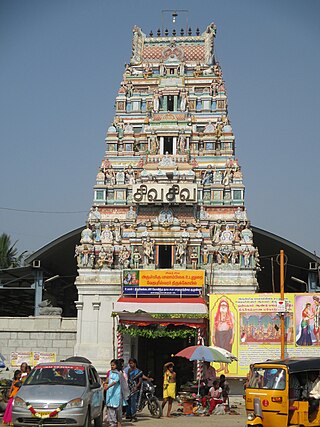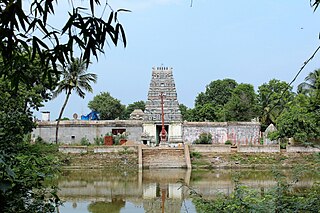
Uthamar Kovil in Uthamarkoil, a village in the outskirts of Tiruchirappalli in the South Indian state of Tamil Nadu, is dedicated to the Hindu Trimurti of Vishnu, Shiva, and Brahma. Constructed in the Dravidian style of architecture, the temple is glorified in the Nalayira Divya Prabandham, the early medieval Tamil canon of the Alvar saints from the 6th–9th centuries CE. It is one of the 108 Divya Desams dedicated to Vishnu, who is worshipped as Purushothaman Perumal and his consort Lakshmi as Poornavalli Thayar.

Padmavati also known as Alamelu Manga is a Hindu goddess and the consort of the deity Venkateshvara, a form of Vishnu. She is described as a daughter of a local king and an avatar of goddess Lakshmi, the consort of Vishnu.

Karpaka Vinayaka Temple or Pillaiyarpatti Pillaiyar Temple is a 7th-century-CE rock-cut cave shrine, significantly expanded over the later centuries. It is located in Pillayarpatti village in Tiruppathur Taluk, Sivaganga district in Tamil Nadu, India.

Arulmigu Murugan Temple, Thiruparankundram is a Hindu temple dedicated to the god Murugan at Thiruparankundram, Tamilnadu, India. It is regarded as one of the "First Houses of Murugan". The temple uses rock-cut architecture and is believed to have been built by the Pandyas during the 6th century. According to legend, Murugan slayed the demon Surapadman and married his consort Devasena at the temple. Murugan is also said to have worshipped his father Shiva at the site as Parangirinathar.

The Sri Venkateswara Swami Temple is a Hindu temple situated in the hills of Tirumala at Tirupati in Tirupati district of Andhra Pradesh, India. The temple is dedicated to Venkateswara, a form of Vishnu, who is believed to have appeared on the earth to save mankind from trials and troubles of Kali Yuga. Hence the place is also known by the name Kaliyuga Vaikuntha and the deity here is referred to as Kaliyuga Prathyaksha Daivam. The temple is also known by other names like Tirumala Temple, Tirupati Temple and Tirupati Balaji Temple. Venkateswara is known by many other names: Balaji, Govinda, and Srinivasa. The temple is run by Tirumala Tirupati Devasthanams (TTD), which is under control of Andhra Pradesh Government. The head of TTD is appointed by Andhra Pradesh Government.

Arunachalesvara Temple is a Hindu temple dedicated to the deity Shiva, located at the base of Arunachala hill in the town of Tiruvannamalai in Tamil Nadu, India. It is significant to the Hindu sect of Shaivism as one of the temples associated with the five elements, the Pancha Bhuta Sthalams, and specifically the element of fire, or Agni.

Sri Bhramaramba Mallikarjuna Temple or Srisailam Temple is a Hindu temple dedicated to the deities Shiva and Parvati, located at Srisailam in the Indian state of Andhra Pradesh. It is significant to the Hindu sects of both Shaivism and Shaktism as this temple is referred to as one of the twelve Jyotirlingas of Shiva and as one of the eighteen Shakti Pithas, centres of the Hindu Goddess. Shiva is worshiped as Mallikarjuna, and is represented by the lingam. His consort Parvati is depicted as Bhramaramba.

Kandeeswarar Temple is a Hindu temple dedicated to the god Shiva located in Kandiyur also known as Thirukkandiyur or Tirukkandiyur, near Tiruvaiyaru, Tamil Nadu, India. Shiva is worshiped as Kandeeswarar, and is represented by the lingam and his consort Parvati is depicted as Mangalanayagi. The presiding deity is revered in the 7th century Tamil Saiva canonical work, the Tevaram, written by Tamil poet saints known as the nayanars and classified as Paadal Petra Sthalam. As per legends, Shiva is believed to have destroyed eight different demons and the eight Ashta Veeratanam temples are built signifying each of his victories in the war. The temple is one of the eight where Shiva is believed to have removed one of the five heads of Brahma.

The Karaneeswarar Temple is a 12th-century Hindu temple in the neighbourhood of Mylapore in Chennai, India. The temple is dedicated to Shiva as Karaneeswarar. There are also shrines to Sarvamangala Vinayaka (Ganesha), Dandapani (Kartikeya), Durga, Lakshmi and Saraswati.

Velleeswarar Temple is a Hindu temple in Mylapore, Chennai, Tamil nadu, India. The presiding deity is Shiva as Velleeswarar. This mid-sized temple, spread over 2 acres is one amongst the Seven Shiva Temples of Mylapore. It is situated at South Mada Street, closer to Kapaleeswarar Temple.

Kalyanasundara, also spelt as Kalyansundar and Kalyana Sundara, and known as Kalyanasundara-murti, Vaivahika-murti and Panigrahana-murti ( पाणिंग्रहण-मूर्ति), is the iconographical depiction of the wedding of the Hindu deities Shiva and Parvati. The couple are often depicted performing the panigrahana ritual of a Hindu wedding, where the groom accepts the bride by taking her right hand in his.

Uma Maheswarar Temple of Konerirajapuram in the Mayiladuthurai district in the South Indian state of Tamil Nadu, is a historical temple dedicated to Shiva. Shiva is worshiped as Uma Maheswarar, and is represented by the lingam and his consort Parvati is depicted as Mattuvar Kuzhalammai. The presiding deity is revered in the 7th century Tamil Saiva canonical work, the Tevaram, written by Tamil saint poets known as the nayanars and classified as Paadal Petra Sthalam.
The Sasthamangalam Mahadevar Temple is a Hindu temple in the Sasthamangalam ward of Thiruvananthapuram Municipal Corporation, Kerala State, India. It is located on top of a hill away from the city centre to promote the spiritual tranquility of the shrine. The temple is more than 700 years old according to the available records, and was regularly visited by the Kings of Travancore. It is administered by the Travancore Devaswom Board.

Tirukkazhippalai Palvannanathar Temple is a Hindu temple located at Sivapuri in Cuddalore district of Tamil Nadu, India. The presiding deity is Shiva in the form of Palvannanathar and his consort is known as Vedanayaki. The presiding deity is revered in the 7th century Tamil Saiva canonical work, the Tevaram, written by Tamil saint poets known as the nayanmars and classified as Paadal Petra Sthalam.

Vedapureeswarar Temple is a Hindu temple dedicated to the deity Shiva, located in Thiruverkadu, a Municipality in Tiruvallur district in the South Indian state of Tamil Nadu. Shiva is worshipped as Vedapureeswarar, and is represented by the lingam. His consort Parvati is depicted as Balambigai. The presiding deity is revered in the 7th century Tamil Saiva canonical work, the Tevaram, written by Tamil saint poets known as the Nayanars and classified as Paadal Petra Sthalam.

Kachabeswarar Temple, Thirukachur is a Hindu temple dedicated to the deity Shiva, located in Thirukachur, a village in Kanchipuram district in the South Indian state of Tamil Nadu. Shiva is worshipped as Kachabeswarar, and is represented by the lingam. His consort Parvati is depicted as Antanatchi and Kanniyumaiyal. The presiding deity is revered in the 7th-century CE Tamil Saiva canonical work, the Tevaram, written by Tamil saint poets known as the Nayanars and classified as Paadal Petra Sthalam. The temple is counted as a twin temple along with Marundeeswarar Temple located in the same village.

Vaseeswarar Temple is a Hindu temple dedicated to the deity Shiva, located in Thirupasoor, a village in Tiruvallur district in the South Indian state of Tamil Nadu. Shiva is worshiped as Vaseeswarar, and is represented by the lingam. His consort Parvati is depicted as Pasupathinayagi. The temple is located on the Southern banks of Poondi reservoir on the Thiruvallur - Thiruthani road, 5 km (3.1 mi) away from the town. The presiding deity is revered in the 7th-century CE Tamil Saiva canonical work, the Tevaram, written by Tamil saint poets known as the nayanmars and classified as Paadal Petra Sthalam.

Jalanatheeswarar Temple is a Hindu temple dedicated to the deity Shiva, located in Thakkolam, a village in Vellore district in the South Indian state of Tamil Nadu. Shiva is worshipped as Jalanatheeswarar, and is represented by the lingam. His consort Parvati is depicted as Giriraja Kannikambal. The presiding deity is revered in the 7th century Tamil Saiva canonical work, the Tevaram, written by Tamil saint poets known as the Nayanars and classified as Paadal Petra Sthalam.

Thirukumaresar Temple is a Hindu temple dedicated to the deity Shiva, located in a ' RAJENDIRAPATTINAM ' also refer as 'YAZHPANAMPATTINAM' or ' ERUKATHAMPULIYUR ' is a village in Cuddalore district in the South Indian state of Tamil Nadu. Shiva is worshipped as Thirukumaresar, and is represented by the lingam. His consort Parvati is depicted as Verumulai Amman. The presiding deity is revered in the 7th century Tamil Saiva canonical work, the Tevaram, written by Tamil saint poets known as the Nayanars and classified as Paadal Petra Sthalam. The temple is also the birthplace of Saiva saint Tirunilakanta Nayanar
Nandeesvarar Temple is a Hindu temple dedicated to the deity Shiva, located at Nandivanam in Kanchipuram district, Tamil Nadu, India.




















